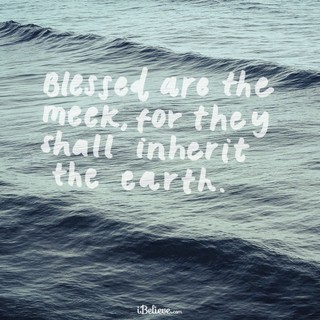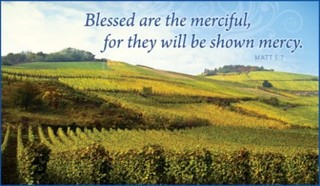
- Recent Translations
- All Translations
Matthew 5:22
Share
Settings
Matthew 5:22 Meaning and Commentary
But I say unto you
This is a Rabbinical way of speaking, used when a question is determined, and a false notion is refuted; it is a magisterial form of expression, and well suits with Christ, the great teacher and master in Israel; who spake as one having authority, opposing himself, not to the law of "Moses, thou shalt not kill"; but to the false gloss the ancient doctors had put upon it, with which their later ones agreed. You say, that if one man kills another himself, he is to be put to death by the sanhedrim; and if he does it by proxy, he is to be left to the judgment of God, so wholly restraining the law to actual murder; but I affirm, that
whosoever is angry with his brother without a cause, shall be in
danger of judgment.
By "brother" is meant, not in a religious sense, one that is of the same faith, or in the same church state; nor, in a strict natural sense, one that is so in the bonds of consanguinity; but in a large sense, any man, of whatsoever country or nation: for we are to be angry with no man; that is, as is rightly added,
without a cause:
for otherwise there is an anger which is not sinful, is in God, in Christ, in the holy angels; and is commendable in the people of God, when it arises from a true zeal for religion, the glory of God, and the interest of Christ; and is kindled against sin, their own, or others, all manner of vice, false doctrine, and false worship: but it is causeless anger which is here condemned by Christ, as a breach of the law, "thou shalt not kill"; and such persons are
in danger of judgment;
not of any of the courts of judicature among the Jews, as the sanhedrim of three, or of twenty three, or of seventy one, which took no notice of anger, as a passion in the mind, only of facts committed; but of the judgment of God, as in the preceding "verse", it being distinguished from the sanhedrim, or council, in the next clause.
And whosoever shall say to his brother Raca, shall be in danger
of the council,
or "sanhedrim". The word Raca is expressive of indignation and contempt; it was used as a term of reproach. Some derive it from (qqr) to "spit upon"; as if the person that used it thought the man he spoke to deserved to be spit upon, and treated in the most contemptuous manner: but rather the word signifies "empty" and "vain", and denotes a worthless, empty headed man; a man of no brains; a foolish, witless, fellow: so it is often used in Jewish writings. Take a few instances, as follow:
``a certain person said to R. Jochanan F23, Rabbi, expound, for it becomes thee to expound; for as thou hast said, so have I seen: he replied to him, (aqyr) Reka, if thou hadst not seen, thou wouldst not have believed.''Again F24, it happened to R. Simeon ben Eliezer of Migdal Edar, who went from the house of Rabbi; and he met with a certain man very much deformed; he says unto him, (hqyr) Reka, how many are the deformed sons of "Abraham our father?" Many more instances might be given F25. Now I do not find that the use of this reproachful word was cognizable by the Jewish sanhedrim, or great council; nor is it our Lord's meaning that it was, only that it ought to have been taken notice of in a proper manner, as well as actual murder. He adds,
but whosoever shall say thou fool, shall be danger of hell fire.
The word "fool" does not signify a man of weak parts, one that is very ignorant in things natural; this the word Raca imports; but a wicked reprobate man; in which sense Solomon often uses the word. The Persic version renders it here "wicked". There is a manifest gradation in the text from causeless anger in the breast, or reproachful words; and from thence to a censorious judging of a man's spiritual and eternal estate, which is what is here condemned. "Thou fool", is, thou wicked man, thou ungodly wretch, thou graceless creature, whose portion will be eternal damnation. Calling a man by such names was not allowed of by the Jews themselves, whose rules are:
``he that calls his neighbour a servant, let him be excommunicated; a bastard, let him be beaten with forty stripes; (evr) , "a wicked man", let him descend with him into his life or livelihood F26.''The gloss upon it is,
``as if he should say, to this the sanhedrim is not obliged, but it is lawful to hate him, yea to lessen his sustenance, and exercise his trade,''which was done to bring him to poverty and distress. So, it seems, the sanhedrim were not obliged to take notice of him. Again, they say,
``it is forbidden a man to call his neighbour by a name of reproach F1 everyone that calls his neighbour (evr) , "a wicked man", shall be brought down to hell;''which is pretty much what Christ here says,
shall be in danger of hell fire;
or deserving of hell fire; or liable to, and in danger of punishment, even "unto hell fire". An expression much like this may be observed in Jarchi, on ( Isaiah 24:23 ) where he speaks of some persons (Mnhgl Mnhg ybyywxm) , "who are guilty", deserving, or in danger of "hell unto hell". The word (geenna) , here used, and which is often used in the New Testament for "hell", is but the Hebrew (Mnh ayg) , "Ge-Hinnom", the valley of Hinnom, where the children were caused to pass through the fire to Moloch. This place, the Jewish writers F2 say,
``Was a place well known, near to Jerusalem, a valley, whose fire was never quenched; and in which they burned the bones of anything that was unclean, and dead carcasses, and other pollutions.''Hence the word came to be used among them, as might be shown in innumerable instances, to express the place and state of the damned; and very fitly describes it.
F23 T. Bab. Sanhedrim, fol. 100. 1. T. Bava Bathra, fol. 75. 1.
F24 Massechet Derach Eretz, c. 4. fol. 18. 1.
F25 Vid. T. Bab. Beracot, fol. 32. 2. Zohar in Exod. fol. 50. 2.
F26 T. Bab. Kiddushin, fol. 28. 1. Bava Metzia, fol. 71. 1.
F1 Zohar in Exod. fol. 50. 3.
F2 Sepher Cosri, fol. 57. 2. Vid. Kimchi in Psal. xxvii. 13.

